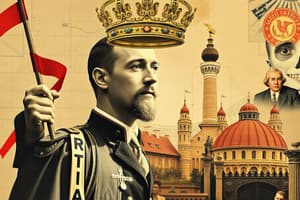Podcast
Questions and Answers
What is an enlightened despot?
What is an enlightened despot?
- A monarch who opposes new ideas
- A ruler who has no absolute power
- A monarch who embraces new ideas and makes reforms (correct)
- A ruler who is always democratic
What does despot mean?
What does despot mean?
Absolute ruler
In what way were the enlightened despots less than true reformers?
In what way were the enlightened despots less than true reformers?
They supported the philosophe's ideas, but weren't willing to give up their power.
Who was Frederick the Great?
Who was Frederick the Great?
What significant reforms did Joseph II of Austria implement?
What significant reforms did Joseph II of Austria implement?
What characterized Catherine the Great's rule?
What characterized Catherine the Great's rule?
What is enlightened despotism?
What is enlightened despotism?
Study Notes
Enlightened Despots
- Monarchs who incorporated Enlightenment ideas and enacted reforms while maintaining absolute power.
- Aimed to strengthen their nations and enhance their governance rather than fully liberate their subjects.
Despot
- Refers to a ruler with absolute power, often ruling without the input or consent of the governed.
Limitations of Enlightened Despots
- Despite their progressive ideas, they did not relinquish their authority.
- Focused on making their states more potent and governing more effectively rather than pursuing true democratic change.
Frederick the Great
- King of Prussia from 1740 to 1786.
- Advocated for religious freedom, reduced censorship, and enhanced education within his realm.
- Implemented justice system reforms and abolished torture, earning the title "the first servant of the state".
- His policies resonated with Enlightenment philosophers.
Joseph II of Austria
- Ruled Austria from 1780 to 1790.
- Introduced significant legal reforms, press freedom, and religious tolerance.
- Abolished serfdom, mandating that peasants be compensated in cash for their labor.
- Many reforms were reversed following his death, limiting their long-term impact.
Catherine the Great
- Ruled Russia from 1762 to 1796 with absolute power.
- Sought to implement reforms, though they were often limited and favored the nobility.
- Granted nobles significant control over serfs while expanding the Russian Empire.
- Achieved strategic access to the Black Sea, enhancing Russia's influence.
Enlightened Despotism
- A governmental form in the 18th century where absolute monarchs enacted reforms inspired by Enlightenment principles, focusing on legal, social, and educational advancements.
Studying That Suits You
Use AI to generate personalized quizzes and flashcards to suit your learning preferences.
Description
Test your knowledge of enlightened despots with these flashcards. This quiz will cover the definitions and characteristics of enlightened monarchs, their reforms, and how they differ from true reformers. Perfect for students studying European history or political theory.




